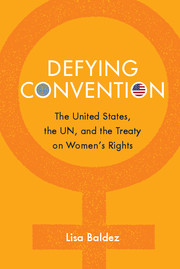Book contents
- Frontmatter
- Dedication
- Contents
- Acknowledgments
- 1 Introduction
- 2 A Scaffolding for Global Women’s Rights, 1945–1970
- 3 Geopolitics and Drafting the UN Treaty on Women’s Rights
- 4 An Evolving Global Norm of Women’s Rights
- 5 CEDAW Impact: Process, Not Policy
- 6 Why the United States Has Not Ratified CEDAW
- 7 CEDAW and Domestic Violence Law in the United States
- 8 Conclusion
- Works Cited
- Index
8 - Conclusion
Published online by Cambridge University Press: 05 August 2014
- Frontmatter
- Dedication
- Contents
- Acknowledgments
- 1 Introduction
- 2 A Scaffolding for Global Women’s Rights, 1945–1970
- 3 Geopolitics and Drafting the UN Treaty on Women’s Rights
- 4 An Evolving Global Norm of Women’s Rights
- 5 CEDAW Impact: Process, Not Policy
- 6 Why the United States Has Not Ratified CEDAW
- 7 CEDAW and Domestic Violence Law in the United States
- 8 Conclusion
- Works Cited
- Index
Summary
The question that motivates this book is why the United States has not ratified CEDAW, the most important guarantee of rights for women in international law. In order to understand this puzzle, I examine three sets of issues. First, I evaluate non-ratification by the United States in a broader historical context of the role that the U.S. government played in shaping the global women’s rights agenda and ultimately in making CEDAW possible. Second, I illuminate U.S. debates about ratification of CEDAW by explaining what the treaty entails. Finally, I examine why the United States remained immune to the process of diffusion that has led all but six other countries to ratify CEDAW. These three themes make up the three parts of the book.
The United States, UN, and Evolution of Women’s Rights as a Global Norm
The first part of the book (Chapters 2 and 3) presents a historical account of how women’s rights emerged as a global norm. The history of global feminism is often presented as a story of ever-advancing efforts to secure women’s rights within the UN and beyond. Scholars trace a progressive arc from the text of the UN Charter, which guarantees the equal rights of men and women, to CEDAW as a treaty that legally obligates countries to take positive action to eliminate discrimination. A focus on the role of the United States in this process, as well as conflicting views among women themselves, challenges this progressive account.
- Type
- Chapter
- Information
- Defying ConventionUS Resistance to the UN Treaty on Women's Rights, pp. 200 - 210Publisher: Cambridge University PressPrint publication year: 2014

